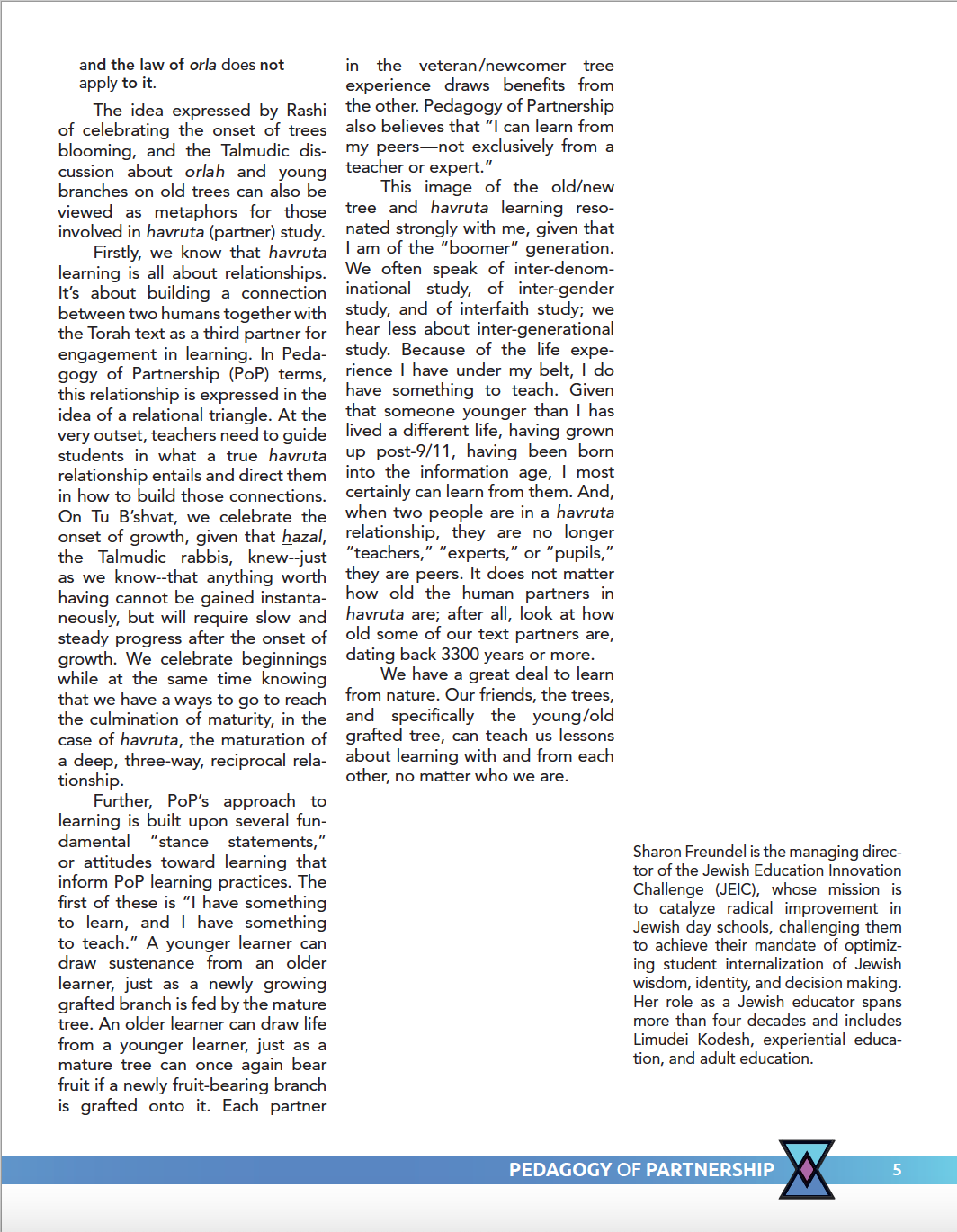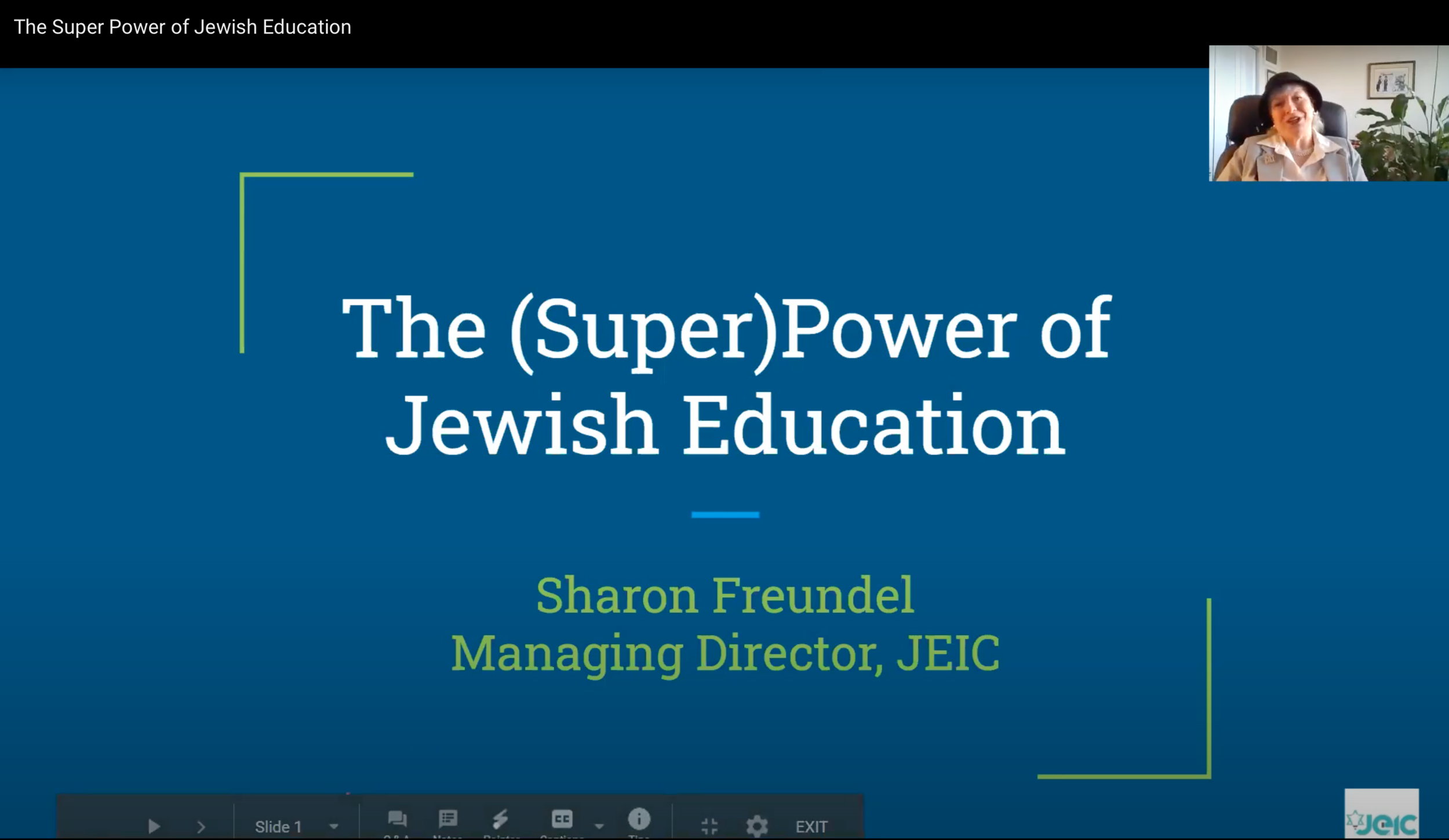In Rabbi Andrew Ergas’ recent piece about “Teaching Hebrews Rather than Hebrew,” he relates that in day schools throughout North America, we encounter different varieties of Hebrew, each stemming from a different historical period of Hebrew’s evolution. Rabbi Ergas suggests that each requires distinct educational goals. “Our task as a community of educators is to appreciate both the connections between the different aspects of Hebrew language learning and their distinctions,” he says. “Unleashing the ways this dynamic language can serve as a key to unlock a multiplicity of pathways toward an enriched Jewish life and community.”
Rachel Mohl Abrahams’s piece, "Enabling Student Agency," was recently published in The Lookstein Center's Jewish Educational Leadership.
In the article, she highlights a few day schools that created opportunities for student independence during the pandemic. She calls on schools to continue to find ways to give students agency over their learning as we move forward.
In this thought-provoking piece, Anthony Knopf maintains that “Given the prominence of ethics in Jewish tradition, an important barometer of our schools’ success should be whether those graduating have been taught to understand, internalize, and apply Judaism’s ethical values.”
He suggests several ways that practitioners can make use of a variety of approaches to help students engage more meaningfully in chesed projects and other character education activities, and urges that “Much more work needs to be done to develop innovative and integrated models for ethics education to help our students understand, internalize and apply Jewish ethical values.”
JEIC managing director Sharon Freundel writes about the power of Jewish education and about her personal journey as an educator and beyond. “Three years ago,” she tells, “I left the classrooms and hallways of the Jewish day school and entered philanthropic work with the idea that I could perhaps make an impact on the world of Jewish day schools beyond the walls of the school in which I was working. And let me tell you; it has been a challenge.”
“We are pleased to join with other foundations dedicated to excellence in Jewish education by supporting the work of Jewish Day School Standards and Benchmarks,” said Mayberg Foundation Executive Director Todd Sukol upon the announcement of JTS’s relaunching of its program.
“The program’s outcomes align closely with the ultimate goals of the Jewish Education Innovation Challenge (JEIC), which we launched almost a decade ago to catalyze radical improvement in Jewish day schools. The Standards and Benchmarks team has supported teachers in an important shift in instruction with a focus on Jewish texts' relevance to the individual learner,” he continued.
“We see this as a crucial component of effective day school education that will have lasting impact on each child and, ultimately, the Jewish people.”
In this blog article, Rabbi Shmuel Feld notes that “The time and energy to teach [a student] more textual skill becomes irrelevant if the student does not want to live a God-connected life.”
The journey through years at a Jewish day school, he poses, “should help students develop into intrinsically-motivated God seekers.”
He suggests, “During tefillah time, a teacher might capitalize on the imagination and empathy found in students.”
Amanda Pogany, Head of School at Luria Academy of Brooklyn, began a journey to create an environment of unconditional respect among students, parents and other schools, applying design thinking in a year-long process that resulted in ‘Four Commitments,’ a framework for “how we communicate and how we function in relationship with one another in our school community.” They came up with four commitments: I will be Kind * I will be Strong * I will be Curious * I will Contribute
In Rachel Mohl Abrahams' recent blog on collaborating to sustain innovation, published in eJewish Philanthropy, she maintains that “allies to create field change may be closer than you think.”
In his op-ed, Rabbi David Stein argues that after a year of “many questions but no obvious answers,” “whatever challenges or opportunities lay ahead must be met with a clear vision of the central goals of Jewish education.”
In Rachel Mohl Abrahams’ “Making Pesach Personal” article in The Yeshiva of Flatbush Alumni Network’s newsletter, she articulates: “ As we prepare to fulfill the mitzvah of “you shall tell your child,” it behooves each of us to consider how we make space for God in our families’ lives. How do we continue to feel that God is caring for each of us? How do we convey that in our homes? The notion of developing one’s own relationship with God needs to be at the core of Jewish education today. We need to ensure that we are helping our children establish and cultivate the feeling that God is actively involved in their lives. Their understanding of God must mature as they grow.”
Rabbi Lord Jonathan Sacks z’’l writes in his book Lessons in Leadership, that “Jews became the only people in history to predicate their very survival on education. The most sacred duty of parents was to teach their children … Judaism became the religion whose heroes were teachers and whose passion was study and the life of the mind. The Mesopotamians built ziggurats. The Egyptians built pyramids. The Greeks built the Parthenon. The Romans built the Coliseum. Jews built schools. That is why they alone, of all the civilisations of the ancient world are still alive and strong, still continuing their ancestors’ vocation, their heritage intact and undiminished.”
Elaborating on Rabbi Sacks’ idea, Sharon Freundel maintains that “by “schools,” he means not buildings, but spaces, physical or virtual, in which learning takes place. Schools are made up of students, educators, parents and other interested individuals. They are not the buildings within which they reside, and this lesson has truly hit home since last March.”
JEIC managing director Sharon Freundel shares her article on “Grounded Meaning” in the winter 2021 Jewish Educational Leadership double-issue about meaning-making in Jewish education.
Sharon Freundel’s article — “Can Zoom Innovations Change Our Teaching For the Better?” was recently featured in Yeshiva University’s Azrieli Papers. Their Volume I on Teaching and Learning explores COVID-19 and Chinuch, lessons learned and opportunities uncovered.
Day schools often teach students to recite prayers even before they can read. As students grow, schools expand the number recited and focus on the performative aspects of Jewish prayer and/or the siddur as text. While this knowledge and skill set has great value, this tendency to focus on the performative overlooks the most important landscape for a meaningful and transformative tefillah experience—the student’s inner life as the field for deepening a connection to God as a source of transcendent love and guidance.
During this webinar by the Jewish Funders Network — the third in a three-part series about remote learning and engagement — Rachel Mohl Abrahams, senior advisor for education grants and programs at the Mayberg Foundation, explores best practices and opportunities in Jewish education and day schools in the context of remote learning.
Many Jewish educators struggle to use Tanakh for its greatest gift — the fashioning of committed Jews. Teachers could guide their students to go down a joyful and fruitful path by inviting students to a world of wonder and belief.
Read about a different strategy for teaching Tanakh in Rabbi Shmuel Feld’s recent blog post, originally published in Prizmah.
Learn about JEIC’s work to reimagine Tefillah, in partnership with the Jewish Federation of Broward County at Brauser Maimonides Academy and Shaarei Bina Torah Academy for Girls in this piece by Rabbi Arnold Samlan in eJewish Philanthropy, titled “Bringing a Spirit of Innovation to Town.”
What can foundational Jewish sources teach us about grading practices in Judaic studies classes?
Ethics of the Sages 2:1 teaches, “רַבִּי אוֹמֵר... וֶהֱוֵי זָהִיר בְּמִצְוָה קַלָּה כְבַחֲמוּרָה, שֶׁאֵין אַתָּה יוֹדֵעַ מַתַּן שְׂכָרָן שֶׁל מִצְוֹת. Rabbi [Judah the Prince] said...And be as careful with an easy commandment as with a difficult one, for you do not know the reward for the fulfillment of the commandments.”
Conversely, 5:2 teaches, “בֶּן הֵא הֵא אוֹמֵר, לְפוּם צַעֲרָא אַגְרָא. Ben Hei Hei said: According to the labor is the reward.”
These statements appear contradictory. Either we don’t know the reward for a given action, or we realize that the greater the effort, the greater the reward. How do we reconcile these two ideas?






















